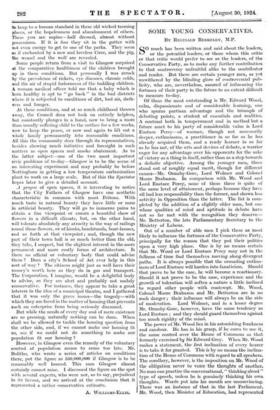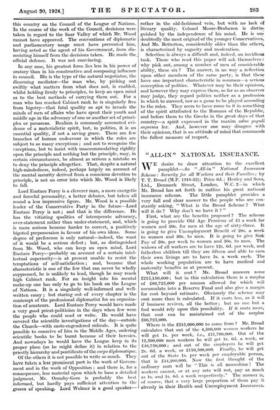SOME YOUNG CONSERVATiVRS.
BY REGINALD BERKELEY, M.P.
QO much has been written and said about the leaders, or the potential leaders, or those whom this critic or that critic would prefer to see as the leaders, of the Conservative Party, as to make any further contribution to that controversy unfruitful alike to the contributor and reader. But there are certain younger men, as yet unwithered by the blinding glare of controversial pub- licity, who are, nevertheless, assured of influencing the fortunes of their party in the future to an extent difficult- to measure to-day.
Of these the most outstanding is Mr. Edward Wood, calm, dispassionate and of considerable learning, one who spurns partisan advantage and the triumph of debating points, a student of essentials and realities. A contrast both in temperament and in method but a future asset to his party of considerable value is Lord Eustace Percy—of warmer, though not necessarily deeper, enthusiasms, a practitioner in so far as he has already acquired them, and a ready learner in so far as he has not, of the arts and devices of debate, a warrior eager for any advantage over his opponents for the sake of victory as a thing in itself, rather than as a step towards a definite objective. Among the younger men, three stand out of roughly equal merit, though for different causes—Mr. Ormsby-Gore, Lord Wolmer and Colonel Moore Brabazon. In comparison with Mr. Wood and Lord Eustace Percy, none of these three is quite of the same level of attainment, perhaps because they have all had less responsibility than the former, and shown less activity in Opposition than the latter. The list is com- pleted by the addition of a slightly older man, but one whose qualities of mind and aptitude in debate have not so far met with the recognition they deserve— Mr. Betterton, the late Parliamentary Secretary to the Ministry of Labour.
Out of a number of able men I pick these as most likely to influence the fortunes of the Conservative Party, principally for the reason that they put their politics upon a very high plane. One is by no means certain that Mr. Wood or Lord Eustace Percy may not in the fullness of time find themselves moving along divergent paths. It is always possible that the crusading enthus- iasm of Lord Eustace will harden into fanaticism. Should that prove to be the case, he will become a reactionary. Should it not prove to be the case, experience and the growth of toleration will soften a nature a little inclined to regard other people with contempt. Mr. Wood, Colonel Moore Brabazon and Mr. Betterton are in no such danger ; their influence will always be on the side of moderation. Lord Wolmer, and in a_ lesser degree Mr. Ormsby-Gore, however, have the same tendency as Lord Eustace ; and they should guard themselves against too much rigidity of the mind.
The power of Mr. Wood lies in his astonishing frankness and candour. He has in his grasp, if he cares to use it, the same control over the House of Commons as that formerly exercised by Sir Edward Grey. When Mr. Wood makes a statement, the first inclination of every hearer is to take it for granted. This is by no means the inclina- tion of the House of Commons with regard to all speakers. The corollary, however, is the imposition on Mr. Wood of the obligation never to voice the thoughts of another. No man can practise the conversational, "thinking aloud" type of speech, unless he is genuinely thinking his own thoughts. Words put into his mouth are unconvincing. There was an instance of that in the last Parliament. Mr. Wood, then Minister of Education, had represented this country on the Council of the League of Nations. In the course of the work of the Council, decisions were taken in regard to the Saar Valley of which Mr. Wood -cannot have approved. The conventions of diplomatic and parliamentary usage must have prevented him, having acted as the agent of his Government, from dis- sociating himself from the decisions taken. He made the, official defence. It was not convincing.
In any case, his greatest force lies less in his power of oratory than in his constructive and composing influence in council. His is the type of the natural negotiator, the disarming mediator—the man who, by picking out swiftly what matters from what does not, is enabled, whilst holding firmly to principles, to keep an open mind as to the best methods of carrying them out. For a man who has reached Cabinet rank he is singularly free from bigotry—that fatal quality so apt to invade the minds of men of affairs who have spent their youth and middle age in the advocacy of one or another set of princi- ples or panaceas. Realism is conunonly accounted evi- dence of a materialistic spirit, but, in politics, it is an essential quality, if not a. saving grace. There are few branches of human endeavour in which the rules are subject to so many exceptions ; and not to recognize the exceptions, but to insist with unaccommodating rigidity upon the principle and nothing but the principle, may, in certain circumstances, be almost as serious a mistake as to deny the principle altogether. That, despite a natural high-mindedness, indeed, perhaps largely on account of the mental security derived from a conscious devotion to principle, is not an error into which Mr. Wood is likely to fall.
Lord Eustace Percy is a cleverer man, a more energetic and forceful personality, a better debater, but taken all round a less impressive figure. Mr. Wood is a possible leader of the Conservative Party in the future—Lord Eustace Percy is not ; and that is the difference. He has the vitiating qualities of intemperate advocacy, over-statement rather than under-statement, and, which is more serious because harder to correct, a positively bigoted prepossession in favour of his own ideas. Some degree of preference is only natural—indeed, the want of it would be a serious defect ; but, as distinguished from Mr. Wood, who can keep an open mind, Lord Eustace Percy—probably on account of a certain intel- lectual superiority—is at present unable to resist the temptations of self-satisfaction ; and, because that characteristic is one of the few that can never be wholly .suppressed, he is unlikely to lead, though he may reach high Cabinet rank. For an insight into his mental make-up one has only to go to his book on the League of Nations. It is a singularly well-informed and well- written essay ; but staring out of every chapter is the contempt of the professional diplomatist for an organiza- tion of amateurs. Lord Eustace Percy would have made a very good priest-politician in the days when few were the people who could read or write. He would have covered the scientific investigations of the day—outside the Church—with caste-engendered ridicule. It is quite possible to conceive of him in the Middle Ages, ordering scientific books to be burnt because of their heresies. And nowadays he would have the League keep in its ,proper place (as he might define it) in relation to the priestly hierarchy and pontificate of the corps diplomatique.
Of the others it is not possible to write so much. 'They have taken a less prominent part in the work of Govern- .ment and in the work of Opposition ; and there is, for a consequence, less material upon which to base a detailed judgment. Mr. Ormsby-Gore is probably the best informed, but hardly pays sufficient attention to the graces of speaking. Lord Wolmer is a good speaker— rather in the old-fashioned vein, but with no lack di literary quality. Colonel Moore-Brabazon is distin-
(j
guished by the independence of his mind. He is unr doubtedly the most original of the younger Conservative, And Mr. Betterton, considerably older than the others, is characterized by sagacity and moderation.
Selection is always a difficult and, indeed, an invidious task. Those who read this paper will ask themselves.: why pick out, among a number of men of considerable ability, these six ? The answer, in no way a reflection upon other members of the same party, is that theie. have one important characteristic in common—a serious conception of politics. Whatever may be their opinions, and however they may express them, so far as an observer may judge, they regard politics neither as a profession in which to succeed, nor as a game to be played according to the rules. They seem to have come to it in something of the spirit attributed to the Romans of the Republic, and before them to the Greeks in the great days of that country—a spirit expressed in the maxim salus popui suprema lex. And, however one may disagree with their opinions, that is an attitude of mind that commands the fullest measure of respect.



































 Previous page
Previous page